Home >Technology peripherals >AI >Full stack intelligence: solving the 'last mile” problem of AI implementation
Full stack intelligence: solving the 'last mile” problem of AI implementation
- 王林forward
- 2023-09-12 12:45:05713browse
"System Theory" believes that a system is a whole that is composed of some interrelated, interactive, and mutually influencing organizational parts and has certain functions. From a system perspective, if the system is decomposed into parts and one part is studied separately, even if each part is studied clearly, the question of system integrity cannot be answered.
In fact, the concept of "System Theory" well expresses the current AI development logic: the entire development of AI is a complete system and ecology, and each of its components should develop collaboratively. The rapid advancement of technology cannot promote the implementation and popularization of AI.
Indeed, the future development of artificial intelligence will follow a similar pattern to the first three industrial revolutions. Only by solving a large number of problems in artificial intelligence applications, reducing production costs, realizing large-scale intelligent innovation in industries, and combining technology with scenarios can all walks of life in China truly benefit from the new role and value of artificial intelligence. This is Opportunities brought by the explosion of artificial intelligence
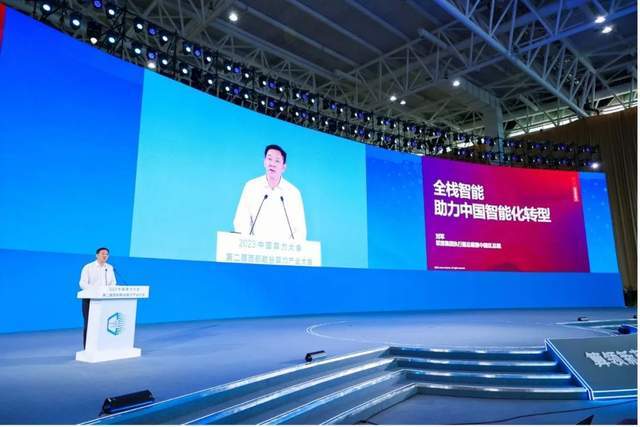
Recently, at the 2023 China Computing Power Conference, Lenovo announced for the first time its "full stack intelligence" layout including AI-embedded smart terminals, AI-oriented infrastructure and AI-native solution services, which is A higher-dimensional industry ecological perspective, a comprehensive technical capability and a full-scenario industry empowerment method, through full-stack intelligent layout and services to better open up the "last mile" of AI implementation and accelerate Intelligent transformation of the entire industry.
Lenovo announced a full-stack intelligent layout, which is a forward-looking layout based on the intelligent transformation strategy. This not only means that Lenovo can better apply artificial intelligence technology to actual practice, making it truly a brand-new service, laying the foundation for promoting intelligent changes in the industry; more importantly, in today's new track of artificial intelligence , Lenovo’s full-stack intelligent layout accumulated and built over the years has made it a unique full-stack intelligent product and solution service provider in the industry, and continues to create greater value in the high-quality development of China’s economy
The implementation of AI in the industry needs to clear the last mile
At present, developing the digital economy is China’s strategic choice to seize new opportunities in a new round of technological revolution and industrial transformation, and AI has become an indispensable new infrastructure in industrial transformation. Especially with the outbreak of AIGC, AI has Its importance has become increasingly prominent in thousands of industries. It is precisely for this reason that promoting AI to play a greater role in the development of the digital economy and serving more enterprises in intelligent upgrading has become a new topic for the entire industry.
Since the beginning of this year, we can see the emergence of a series of revolutionary and landmark technological innovations in the field of AIGC. In the past six months, these innovations have appeared one after another, which means that the era of general artificial intelligence has arrived. In the future, this will trigger a new wave and revolution of industrial and enterprise intelligence
For example, AI is redefining the human-computer interaction model. With the help of AI "Copilot" tools, it can bring changes to the operation and management of the entire enterprise and organization from three aspects: efficiency, operation, and collaboration; in addition, AI is also The release of intelligent productivity by enterprises has brought huge room for imagination, especially the emergence of AIGC, which has had a significant impact on customer service, sales market, risk management and assisted decision-making; similarly, AI will re-change the internal affairs of enterprises. In the future, industry experience and industry knowledge will be transformed into data, and through AI's enhanced learning of knowledge in specific fields, the transformation from "apprentice learning skills from teachers" to "machine learning skills from teachers" will change the internal structure of the enterprise. The knowledge inheritance model helps enterprises improve production and operation efficiency.

But at the same time, the process of promoting AI to the industry is not "achieved overnight". At this stage, it still faces many challenges, which can be observed from the following dimensions:
First, the combination of industry data and AI technology is not deep enough. Taking the current industry large model training as an example, the first priority is to solve the data governance problem of enterprises. On the one hand, enterprises must obtain a large amount of available and credible data; on the other hand, the data also needs to be fully managed. , forming structured and standardized data can better serve large model training.
At the same time, training large models also requires selecting appropriate algorithms and parameters to ensure the accuracy and efficiency of the model. Therefore, for enterprises, how to choose a suitable pre-training model, how to quickly produce accurate results through fine-tuning based on mature large models under specific scenarios and tasks, and whether to choose commercial or open source large model services? And balancing cost and training effect, these are very "troublesome" issues, which requires enterprises to promote a closer integration of industry data and AI technology so that it can better adapt to the needs of enterprise AI applications.
Secondly, a large number of application scenarios in the industry are too scattered. To maximize the value of AI, it is necessary to start from the key scenarios in the production and operation of enterprises and bring real "cost reduction and efficiency improvement" value to enterprises. Gartner’s report points out that Chinese companies are strongly committed to using artificial intelligence to improve production efficiency, customer experience and business growth. But we must also note that in the process of enterprise intelligent transformation, the application of AI itself is a complex process involving multiple business scenarios and technologies.
This also means that companies need to focus on key and core application scenarios, such as quality control, safety production and factory energy conservation in manufacturing, accumulate industry experience through continuous practice, and integrate these needs into AI applications. Among them, only by applying AI capabilities to all aspects of the enterprise can we continuously lower the threshold for using AI, accelerate the intelligent upgrade of enterprises, and enable enterprises to develop from the digital driving stage to the intelligent pulling stage.
Third, as the richness of application scenarios increases, the amount of data and algorithm complexity also gradually increases, placing higher requirements on computing power. Data shows that since 2018, with the launch of the Transformer large model, computing power has not doubled every 18-20 months as in the past, nor has it doubled every 6 months during deep learning. times, but now growing hundreds of times every year.

There is a clear difference between AI computing power and general computing power. From the perspective of parameter quantity, AI computing power ranges from tens of millions to hundreds of billions. From an application perspective, deep learning requires medium-scale training and inference, but now it is necessary to achieve ultra-large-scale training, which poses a greater challenge to the computing infrastructure capabilities of enterprises
It can be seen that these challenges have become an important reason why AI has been hindered from entering the industry. In other words, to unleash the value of AI technology hundreds or thousands of times, it is necessary to use more intelligent computing power, and at the same time further promote the deep integration of AI technology and industry scenarios, so that AI can enter the core production links of the industry. , Only in this way can we maximize the "last mile" of AI implementation in the industry and accelerate the intelligent transformation of thousands of industries.
In this process, whoever can take the lead in helping enterprises open a new path to AI will be able to take the lead in the competition for the future AI market. The answer given by Lenovo at the 2023 China Computing Power Conference is ——Full stack intelligent layout.
Interpretation of Lenovo’s “Full Stack Intelligence” from three dimensions
Over the past few years, we have seen an urgent need to build artificial intelligence applications in various industries. Therefore, the capabilities of AI itself should always be ready. Lenovo has successfully built an end-to-end artificial intelligence technology and application capability set through a comprehensive intelligent layout. This capability set includes native smart terminals, AI-oriented infrastructure, and AI-embedded services and solutions. Through these capabilities, enterprises can accelerate the move into the artificial intelligence era. Specifically:
First of all, it is an AI-native smart terminal. Currently, in the terminal field, Lenovo not only maintains its leading market position, but also has strong self-research capabilities. In addition, Lenovo is also using AI technology to redefine smart terminals, transform terminal experience, and innovate smarter and more diverse smart terminals in terms of interactive experience, task collaboration, and application services.
In the future, Lenovo believes that AI-native smart terminals will have three main development trends. First of all, terminals will continue to improve performance, reduce power consumption, and embed AI computing power to provide a better operating environment for AI models, thus greatly improving user experience. Secondly, the terminal will have an AI-driven interactive interface, allowing users to express their intentions and needs in a more natural way, and operate the terminal in a new way, not just through instructions. In addition, the super intelligent terminal will also be able to seamlessly collaborate with multiple devices, autonomously and automatically complete the user's tasks, becoming a super "intelligent assistant" around the user
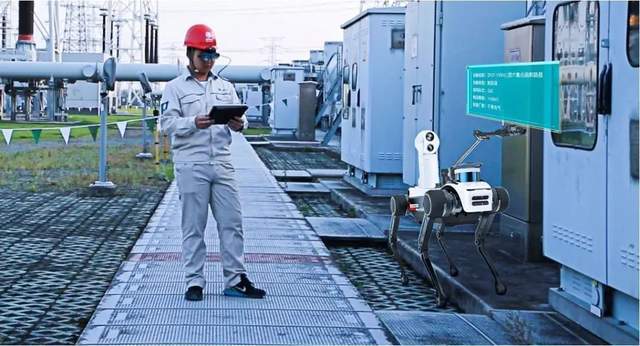
For example, in the electric field, the Morningstar PDA inspection system created by Lenovo has greatly improved the user experience. This system uses PDA (mobile intelligent terminal) to assist operation and maintenance personnel in inspecting equipment, which can effectively improve inspection efficiency. , improve the quality of inspections, and at the same time ensure the effective management of inspection data, and promote the digital transformation of factories and stations. This is just the "epitome" of Lenovo's exploration and innovation in the field of AI-native smart terminals. Today, Lenovo has created Intelligent inspection solutions based on human-machine collaboration, such as PDA intelligent terminals and intelligent four-legged inspection robots, help create a comprehensive intelligent inspection system in an all-round way and promote the intelligent transformation of energy systems such as power grids.
Secondly, it is AI-oriented infrastructure. It includes two dimensions of characteristics, namely "AI empowering intelligence and green empowerment". Among them, "AI empowers intelligence" means that in the future, Lenovo will make 100% of its computing infrastructure products support AI, invest 50% of its infrastructure research and development in the AI field, and fully cover all AI applications with AI technology. At present, Lenovo has achieved capability support for AI large model and ultra-large model training, as well as AI model training and inference, with parameter scales ranging from tens of millions to hundreds of billions. At the same time, Lenovo has launched more than 60 infrastructure products that support artificial intelligence applications, including servers, storage, etc.
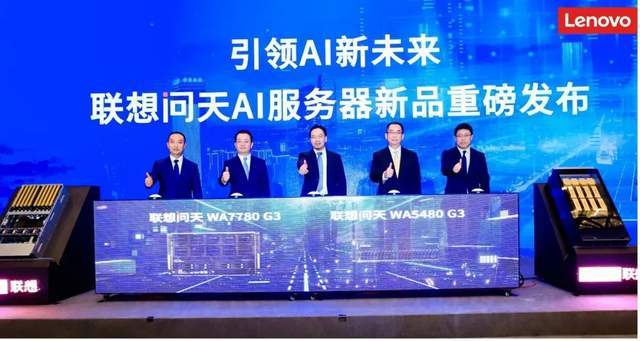
"Green empowerment" refers to Lenovo's comprehensive layout and leadership in liquid cooling technology, creating a "lighthouse" of liquid cooling cluster solutions, and promoting the sustainable development of the intelligent computing industry with green computing power infrastructure. It is understood that Lenovo’s liquid cooling technology currently covers mainstream liquid cooling technologies such as air-liquid cooling hybrid, full liquid cooling, whole cabinet liquid cooling, and single-phase immersion liquid cooling. At the same time, Lenovo continues to develop and lead future liquid cooling technology to solve future kilowatt-level chip heat dissipation problems, improve memory liquid cooling coverage efficiency, and explore the ultimate in energy efficiency.
It should be said that under the general trend of industrial intelligence, Lenovo's creation of AI-oriented computing infrastructure can obviously accelerate the implementation of artificial intelligence in thousands of industries, thus promoting the intelligent transformation of various industries and even the entire society. process; at the same time, under the background that green and low-carbon has become a "certain" trend in the future, Lenovo focuses on the most urgent needs of industry customers and creates new computing infrastructure with innovative products and solutions in the field of liquid cooling. It can also provide stable and reliable green computing power for the digital transformation of various industries and the development of the digital economy.
Finally, there are AI embedded services and solutions. It includes Lenovo Intelligent Computing Center solutions, Lenovo hybrid cloud solutions, Lenovo brain-embedded solutions and end-to-end full-cycle Lenovo Intelligent Computing Center services and Zhencomputing services.
Among them, at the level of building intelligent computing data centers, Lenovo’s one-stop service solution integrating consulting, design, integration and operation and maintenance can provide full life cycle services for different customers and accompany customers throughout the entire process of intelligent transformation. Through the "everything can be subscribed" Lenovo Computing Service 2.0, customers can also subscribe on demand and pay flexibly, comprehensively helping to solve customer pain points, reaching multiple industries and covering all scenarios.
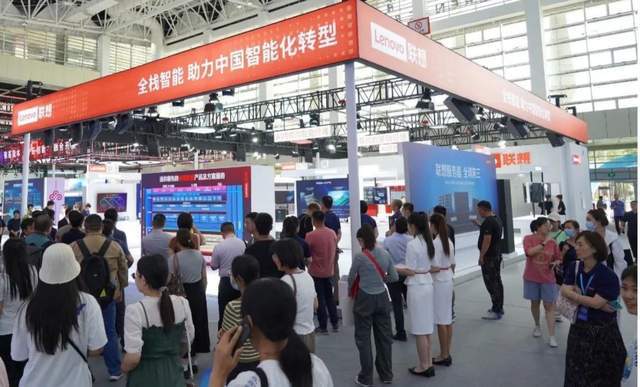
It is worth mentioning that based on Lenovo’s own practice and the Lenovo brain module in the Optimus Engine, it is also providing smart solutions for general scenarios and industry scenarios with AI capabilities embedded in all walks of life. Currently, It already has application cases in many industries such as government, education, manufacturing, finance, operators, and the Internet.
The services and solutions embedded through Lenovo AI are actually a key step in applying AI technology to actual business scenarios. These services and solutions help customers from all walks of life build differentiated competitive advantages on the shoulders of giants, better embrace the new era of AI, and promote the acceleration of enterprise intelligent transformation
Before this, AI capabilities were often the "patent" of large companies. In the new era of the outbreak of AIGC, only by making AI capabilities available to thousands of industries can we promote the intelligent transformation and change of the entire China. , and Lenovo "starts" from three aspects: "AI-embedded smart terminals, AI-oriented infrastructure, and AI-native services and solutions" to fully empower enterprises to embrace intelligent changes, which also reflects Lenovo's full-stack intelligent layout The value and core of AI make AI become the "water" and "electricity" for enterprises to move into the new era of AI in a more real sense.
Full stack intelligence is the key to promoting intelligent changes in the industry
Lenovo has already laid the groundwork for the implementation of full-stack intelligent layout. As early as 2017, Lenovo proactively saw the opportunities brought by the intelligent revolution in China. To this end, Lenovo has proposed a 3S strategy and is committed to becoming a leader and enabler of intelligent change. After six years of transformation, Lenovo’s 3S strategy has achieved phased results
In the smart IoT business segment, Lenovo is the world's major supplier of PCs, tablets and mobile phones. In the intelligent infrastructure business segment, Lenovo has become the world's third largest artificial intelligence infrastructure and server supplier, and has the fastest growth among the top three. In the field of high-performance computing, Lenovo has been the leader in the global and Chinese markets for many years. In the solutions and services business segment, Lenovo has created a new intelligent IT engine - Lenovo Qingtian
based on the new IT architecture and "end-edge-cloud-network-intelligence".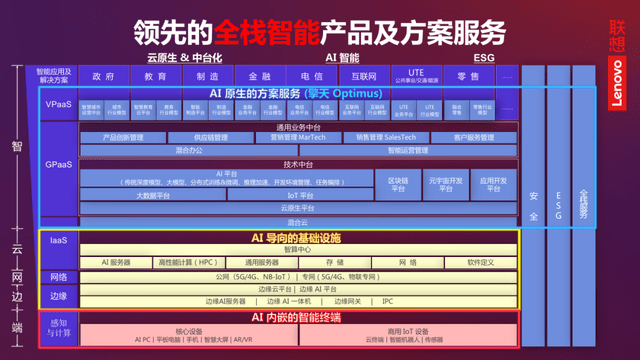
Lenovo Qingtian is a solution that includes a hybrid cloud platform, a technical middle platform, a general business middle platform, and a VPaaS layer for different industry fields. These solutions are based on Optimus Engine and are cloud native, mid-level, AI intelligent and green. In addition, Qingtian also provides one-stop solutions that can tailor digital intelligent transformation for customers from all walks of life. At present, Qingtian has developed more than 40 solutions with Lenovo’s independent intellectual property rights, promoting the upgrade of the entire value chain
It can be seen that in the past few years, Lenovo has been accompanying China's informatization, digitalization and intelligence development path. It has not only established 3S full-stack advantages, but also accumulated key technologies, products and service capabilities in the field of intelligent transformation. This makes Lenovo a unique full-stack intelligent product and solution service provider in the industry, providing better support for enterprises’ digital transformation in the intelligent era
It can be said that behind the implementation of the full-stack intelligent layout, it also represents that Lenovo is helping enterprises with a higher-dimensional industry ecological perspective, a full range of technical capabilities and a full-scenario industry empowerment approach. Determination and confidence to achieve digital and intelligent transformation and accelerate the implementation of intelligent industry.
Lenovo has made important arrangements in terms of all-round technical capabilities. On the one hand, it provides key AI computing power infrastructure, provides technical support for very large models (represented by AIGC), and promotes the realization and application of the entire AI "universal intelligence" computing power. On the other hand, Lenovo has also effectively promoted the application of AI technology in the core production links of various industries, empowering thousands of industries
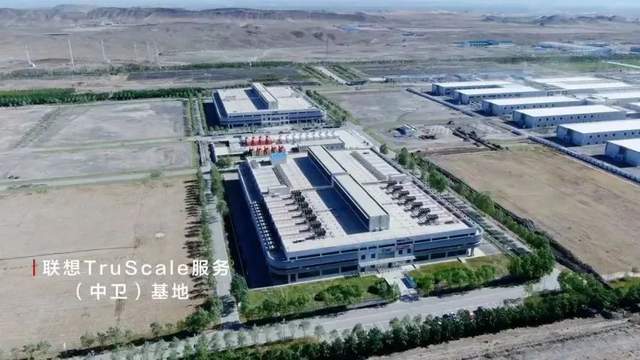
One of the most typical cases is the Lenovo Computing Service (Zhongwei) base built by Lenovo in Ningxia. This base is Lenovo’s first computing service base, pioneering the subscription model of computing services. Under this service model, industry customers can pay quarterly, monthly, or even based on actual computing power usage based on actual usage. This can greatly reduce the financial pressure faced by computing power providers due to the rapid growth of computing power demand. This integration of the traditional decentralized procurement model of hardware, software, and services, and the segmented implementation model of design, construction, and operation and maintenance into a one-stop all-inclusive service model that can be subscribed not only reflects Lenovo's full-stack intelligence capabilities, It is also the best proof that Lenovo promotes the implementation of universal computing power and better empowers all walks of life
On the other hand, from the perspective of full-scenario industry empowerment, based on the full-stack intelligent layout, Lenovo has also achieved full-scenario empowerment of industry applications. Currently, Lenovo has created a comprehensive solution from consulting, deployment to operation and maintenance. "One-stop" full-cycle services, and based on this full-stack, full-lifecycle intelligent service advantage, Lenovo provides services in smart education, smart cities, smart manufacturing, smart healthcare, smart transportation and other industries, as well as smart supply chain, smart marketing , smart customer service and other segmented application scenarios to meet the needs of enterprises for intelligent transformation.
Data also shows that Lenovo has so far helped more than 500 medium and large enterprises such as Sany Heavy Industry, XCMG, Shaanxi Heavy Duty Truck, and TPV to embark on the road of intelligent transformation, truly opening up the "last mile" of industry AI implementation. .
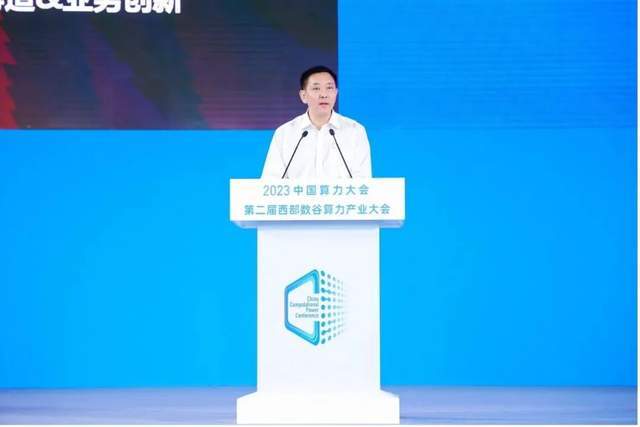
As the so-called "Spring River Plumbing Duck Prophet", at the 2023 China Computing Power Conference, Liu Jun, Executive Vice President of Lenovo Group and President of China, also said in his opening speech: "With the in-depth development of intelligence in the future, In the process, China will accelerate the formation of a complete AI ecosystem, and this ecosystem will present three major characteristics: terminal super intelligence, hybrid architecture computing, and industry-wide full-scenario applications."
Objectively speaking, this judgment has important reference and reference value for the development of China's future AI market. This means that AI will move towards a broader market in the future and silently drive the intelligent transformation of the entire industry. Likewise, more ecological partners are needed to join in. Through mutual cooperation and joint innovation, we can better promote the intelligent transformation of the entire industry. As Liu Jun said: "Lenovo will join hands with all walks of life in the future to jointly support China's intelligent transformation, promote the deep integration of the digital economy and the real economy, and promote China's high-quality development."
We know that an aircraft carrier is a powerful weapon to dominate the ocean, because it is like a mobile airport, making it possible for the vast sea surface to become a base for aircraft to take off and land, so that aircraft operations can be more maneuverable, changeable, and continuous. sex. From this perspective, in the new era of AI, Lenovo's full-stack intelligent layout is like an "aircraft carrier". Enterprises can find the services they need on this aircraft carrier, and are no longer limited to hardware, software, computing power, and algorithms. and data. Therefore, it can be said that Lenovo has built a "capability set" and "service set" for enterprises to move into the new era of AI through full-stack intelligent layout. I believe it will also accelerate the process of intelligent transformation of the entire industry and better promote the high-level development of China's economy. Quality development.
The above is the detailed content of Full stack intelligence: solving the 'last mile” problem of AI implementation. For more information, please follow other related articles on the PHP Chinese website!
Related articles
See more- Front-end intelligence is becoming the second foothold of AI security
- CITIC Construction Investment Research Report: The implementation of AI boosts the strong rise of the gaming sector
- To solve the biggest obstacle to the implementation of AI, has OpenAI found a way?
- Industry Trends | The implementation of application-side AI, looking at the future of cloud computing from North American giants
- How to use PHP and Selenium to get through the last mile of web crawler development

